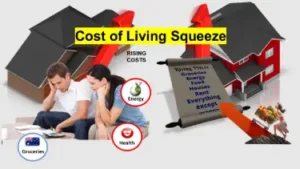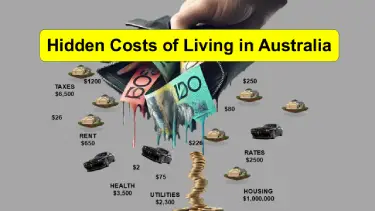Description
The hidden costs of living in Australia. Discover hidden fees in Aussie life, from tolls to banking, and how they affect your wallet. Learn to fight back.
Introduction: The Problem You Didn’t Know You Had
 Picture this: it’s payday. You’re finally breathing a little easier, planning to put some money aside. But as your bills roll in—insurance, tolls, phone charges, bank fees—you feel that sinking dread. “Where did my money go?”
Picture this: it’s payday. You’re finally breathing a little easier, planning to put some money aside. But as your bills roll in—insurance, tolls, phone charges, bank fees—you feel that sinking dread. “Where did my money go?”
Everyday Australians are being hit with hidden costs that quietly eat away at their financial stability. From sneaky banking charges to toll roads controlled by private corporations, the burden is growing. These costs are rarely disclosed up front, but their cumulative impact is staggering.
Let’s unpack the hidden fees shaping our lives and explore how Australia’s dollar sovereignty could help us reclaim public control over essential services.
The Problem: Everyday Australians Are Being Nickel-and-dime
 In a nation as wealthy as Australia, it seems absurd that citizens face financial traps in daily life. Yet hidden costs lurk in:
In a nation as wealthy as Australia, it seems absurd that citizens face financial traps in daily life. Yet hidden costs lurk in:
1. Toll Roads – Privatised Pathways to Profit
Imagine a young couple commuting from Western Sydney. Each day, they fork out over $20 just to drive to work and back. Multiply that by 20 working days, and that’s over $400 per month—the equivalent of a utility bill.
Most Australians assume toll roads are publicly owned. In reality, the vast majority are privatised. Companies like Transurban dominate the network, with long-term monopolies enshrined in public-private partnerships (PPPs). These deals prioritise shareholder returns over affordability.
2. Telecommunications – Confusing Contracts and Overcharges
Have you ever looked at your phone bill and wondered, “What’s that charge for?” From premium SMS services you never signed up for the mysterious ‘account management fees,’ telcos often mask these in fine print.
Telstra, Optus, and Vodafone have all faced scrutiny for unethical billing practices. While regulators have issued fines, the problems persist.
3. Banking Fees – The Price of Holding Your Own Money
Australians pay billions annually in bank fees. Account-keeping charges, ATM withdrawal costs, and hidden interest rate terms are standard.
A retiree in Brisbane shared, “I thought I had a fee-free pension account, but then I got hit with a $6 monthly charge for ‘inactivity’. I felt penalised for being careful with my money.”
4. Insurance – Policies That Promise More Than They Deliver
Home and car insurance often include excesses and conditional clauses. Some customers find out only after lodging a claim that they aren’t covered due to vague exclusions.
A Melbourne single mother shared, “My car was vandalised. The insurer said because it happened at night in a ‘high-risk’ suburb, I wasn’t eligible. That wasn’t in the policy I read.”
The Emotional and Economic Impact
The real toll isn’t just financial. It’s emotional.
A Sydney nurse earning below the median wage puts it bluntly: “Between rent, tolls, and bills, I’m treading water. The worst part is, I feel like I’m failing even though I’m doing everything right.”
These hidden costs lead to:
– Increased financial stress
– Reduced savings capacity
– Erosion of trust in institutions
– Greater economic inequality
Families are forced to choose between paying a toll or buying fresh produce. Young people delay homeownership, not because of laziness, but because recurring hidden fees cripple their ability to save.
How We Reclaim Control and Transparency
1. Expose and Regulate Hidden Costs
Stronger regulation can eliminate deceptive charges. Government agencies must mandate clear, upfront disclosure of all fees.
– Reform banking laws to require itemised statements and ban inactivity fees.
– Force telecom companies to simplify contracts and notify customers of premium service subscriptions.
– Audit toll road contracts to reassess their fairness and potential public buyback options.
2. Invest Public Money in Public Goods
Australia is a sovereign currency issuer. That means our federal government can always afford to fund public services without relying on taxes or borrowing. There is no financial excuse for outsourcing essential infrastructure to profit-driven corporations.
– Fund toll-free public roads.
– Provide affordable public insurance options.
– Expand public banking alternatives, such as a postal bank.
3. Community Advocacy and Awareness
Change begins with awareness. Organisations like Social Justice Australia play a vital role in informing the public and pushing for reform.
Support efforts to:
– Monitor pricing practices
– Launch class actions
– Demand legislative change
Summary: A Fairer Path Forward
Australians shouldn’t have to navigate a minefield of hidden costs just to survive. Every toll, bank fee, and fine-print clause is a symptom of a more in-depth problem: the prioritisation of corporate profit over public good.
But this path is not irreversible.
Through transparency, regulation, and the power of Australia’s dollar sovereignty, we can reclaim what has quietly been taken from us: fairness, accountability, and the right to live without being exploited.
Question for Readers
Have you encountered a hidden fee that made you feel cheated or powerless? How did it affect your life? Please let us know in the comments below.
Q&A Section
Q1: Are toll roads public or private in Australia?
Most toll roads are privately operated under long-term contracts. Companies like Transurban profit from roads initially built with public money.
Q2: Are there hidden fees I should be aware of in everyday life?
Yes. Banking, telecom, insurance, and even roads come with often undisclosed fees. Read all terms carefully and push for transparency.
Q3: What role does dollar sovereignty play in fixing this?
Australia’s sovereign currency status allows the federal government to fund public services without needing to privatise or impose hidden costs. It’s a matter of political will.
Call to Action
If you found this article insightful, explore more about political reform and Australia’s monetary sovereignty at Social Justice Australia: https://socialjusticeaustralia.com.au/.
Share this article with your community to help drive the conversation toward a more just and equal society.
Click on our “Reader Feedback” menu. Please let us know how our content has inspired you. Submit your testimonial and help shape the conversation today!
Q&A Section
Q1: Are toll roads public or private in Australia?
Most toll roads are privately operated under long-term contracts. Companies like Transurban profit from roads initially built with public money.
Q2: Are there hidden fees I should be aware of in everyday life?
Yes. Banking, telecom, insurance, and even roads come with often undisclosed fees. Read all terms carefully and push for transparency.
Q3: What role does dollar sovereignty play in fixing this?
Australia’s sovereign currency status allows the federal government to fund public services without needing to privatise or impose hidden costs of living. It’s a matter of political will.
If you found this article insightful, explore more on political reform and Australia’s monetary sovereignty at Social Justice Australia. :https://socialjusticeaustralia.com.au/
Share this article with your community to help drive the conversation toward a more just and equal society.
Click on our “Reader Feedback”. Please let us know how our content has inspired you. Submit your testimonial and help shape the conversation today!
Additionally, leave a comment about this article below.
Support Social Justice Australia – Help Keep This Platform Running
Social Justice Australia is committed to delivering independent, in-depth analysis of critical issues affecting Australians. Unlike corporate-backed media, we rely on our readers to sustain this platform.
If you find value in our content, consider making a small donation to help cover the costs of hosting, maintenance, and continued research. No matter how small, every contribution makes a real difference in keeping this site accessible and ad-free.
💡 Your support helps:
✅ Keep this website running without corporate influence
✅ Fund research and publishing of articles that challenge the status quo
✅ Expand awareness of policies that affect everyday Australians
💰 A one-time or monthly donation ensures Social Justice Australia stays a strong, independent voice.
🔗 Donate Now
Thank you for being part of this movement for change. Your support is truly appreciated!
References
Boost Mobile: https://boost.com.au/pages/prepaid-plans
AldiMobile: https://www.aldimobile.com.au/collections/mobile-plans
Money Smart the Australian Securities and Investments Commission (ASIC): https://moneysmart.gov.au/
Australian Tax Office: https://www.ato.gov.au/individuals-and-families
Feeling overwhelmed by a tight budget and growing costs?: https://www.abc.net.au/news/2023-07-02/overwhelmed-tight-budget-finances-households-cost-living-tips/102511348
Talk Money: https://talkmoney.org.au/
Free Budget Templates: https://create.microsoft.com/en-us/templates/budgets


NOTHING IN LIFE IS FREE. IS THE CATCH CRY OF LANDLORDS’
Land lording is a monopoly.
How do landlords make a profit?” “By lording land.”
Quite literally, a landlord monopolizes a piece of property, then preys on the desperation of others to extract rent. They’re exactly like ticket scalpers who buy more tickets than they need, then hoard them to drive up the price. Landlords are just house scalpers who contribute no value to the economy: “A propertied class is freed from the labour of production through its ability to maintain itself out of a surplus extracted from the primary producers, whether by compulsion or by persuasion or (as in most cases) by a mixture of the two.”
Consider this horrible Evil Landlords of South Australia who aims to devour $1 billion in property in order to “provide” 4,000 single-family homes to the working class. “Provide?” Land-lorders do not provide goods or a service.
They hold a property hostage. They literally lord a house over others.
In fact, I chatted with a landlord this week who informed me of his plans to buy the multi-acre field beside his mansion and tennis court “to stop anyone from building on it.” In other words, the huge rents his tenants are paying to stay sheltered are being used to monopolize more land to keep others from having shelter.
Landlords lack the creativity, drive, risk, time, and/or skill to build real, productive businesses that contribute goods and services to the world, so they choose to lord land over others instead.
Land-lording is lazy, and it is a gross misallocation of capital. It is the textbook definition of rent-seeking: “Rent-seeking is the effort to increase one’s share of existing wealth without creating new wealth. Rent-seeking results in reduced economic efficiency through misallocation of resources, reduced wealth creation, lost government revenue, heightened income inequality, and potential national decline. “In other words, land-lording is a form of communal theft.”
In other words, the land-lording class will squeeze from the productive class as much wealth as it can realistically wring out before the rent-serf dies.
“The landlords operate a certain kind of monopoly against the tenants. The demand for their commodity, site and soil, can go on expanding indefinitely; but there is only a given, limited amount of their commodity…. The bargain struck between landlord and tenant is always advantageous to the former in the greatest possible degree.”
Landlords own all the rental homes, and since rent-serfs cannot afford to purchase shelter in a privatized economy — how could you possibly save up a down payment while you’re paying someone else’s mortgage? — they have no choice but to pay maximal usury to a landlord. But why do landlords have the “right” to charge what they do? The answer is simple the majority of Politicians and Lawyers collect rent it does not matter what political party is in Power. They will continue to pass legislation that forces the price of a shelter upwards. Because they own all the houses.
Because they have a capital (or usually credit) advantage over rent-serfs. Real estate investors can always afford to outbid would-be homeowners. Therefore, prices rise. Therefore, more productive contributors must become rent-serfs and compete for fewer rental properties. Rent costs rise. Investment values rise. The whole inequality structure spins higher and higher until the working class is crushed. imagine what it would be like if the majority of politician’s were pedophiles’. the fact is Landlords control the world; every price rise is a result of a business having to pass on the extra rent they pay to a landlord. copy and share.
Hi Frank,
Thank you for your thoughtful comment. There is much room for improvement, but I think one of that main problems in fixing any issue is the serious lack of political will. I do not believe our key politicians are working for the people, but for corporations and their political donors.